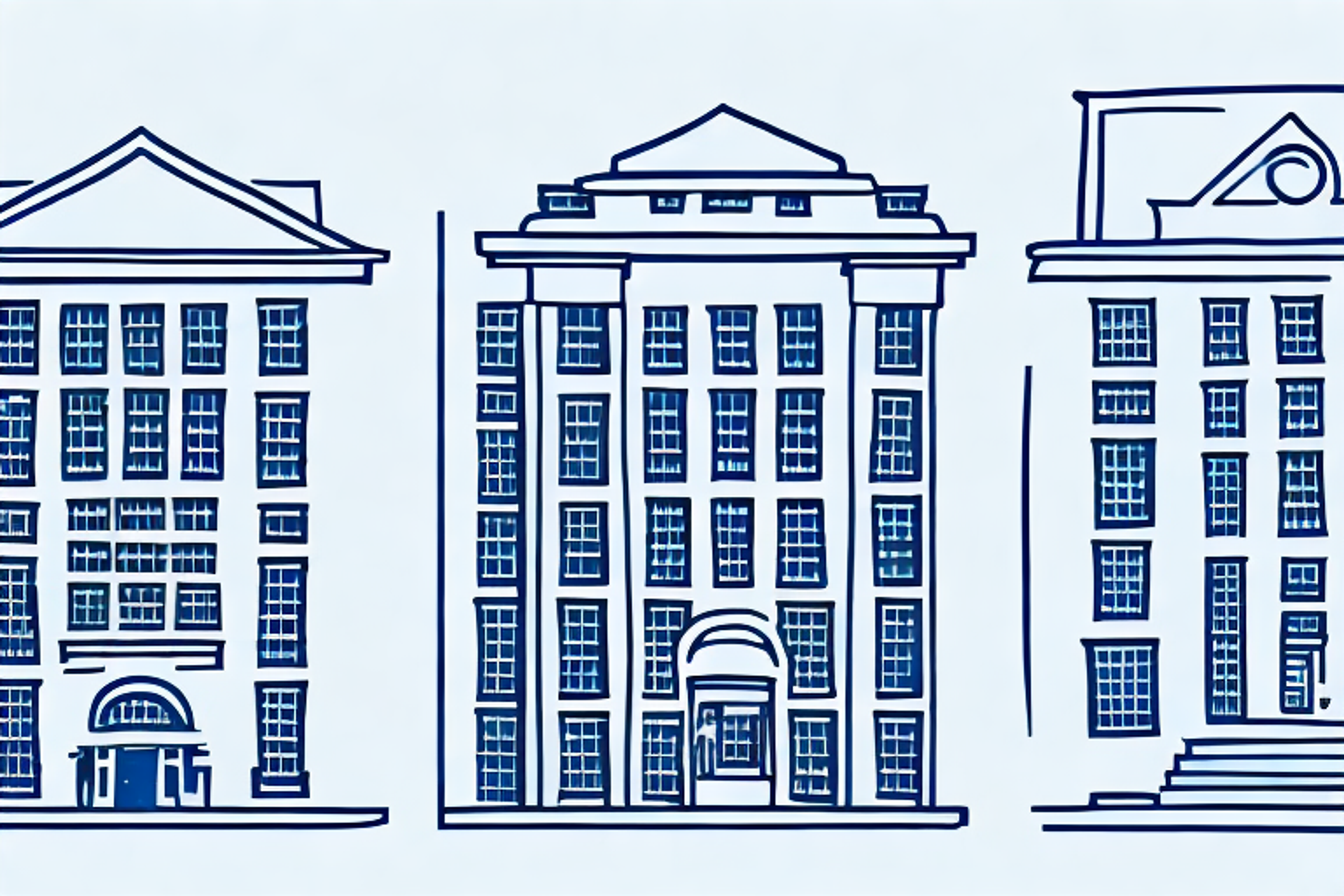Harvard Law School Vs. Duke University School of Law: An In-Depth Comparison
Are you considering pursuing a law degree but can't decide between Harvard Law School and Duke University School of Law? Look no further! Our in-depth comparison breaks down the key differences between these two prestigious institutions, helping you make an informed decision about your future.
Posted March 6, 2025

Table of Contents
When it comes to choosing a law school, there are many factors to consider. Two of the most prestigious institutions in the United States are Harvard Law School and Duke University School of Law. If you're trying to decide between these two excellent programs, it's essential to understand the differences and similarities between them before making a decision. In this article, we'll take an in-depth look at Harvard Law School and Duke University School of Law in terms of their reputation, course offerings, faculty profiles, admissions process, student life, career prospects, alumni networks, law clinics and experiential learning, diversity and inclusion, and campus facilities and resources. By the end of this article, you should have all the information you need to make an informed choice about which law school is right for you.
Introduction: Setting the Stage for the Comparison
Before we dive into specifics, let's provide an overview of each institution. Harvard Law School, located in Cambridge, Massachusetts, is a part of Harvard University and is one of the most prestigious law schools in the world. Established in 1817, the school currently has around 1,900 students and a faculty of over 100 professors and instructors.
Duke University School of Law, located in Durham, North Carolina, is a part of Duke University and is known for its rigorous academic program. Established in 1930, it currently has approximately 640 students and a faculty of around 70 professors and instructors.
While both Harvard Law School and Duke University School of Law are highly respected institutions, they differ in their approach to legal education. Harvard Law School places a strong emphasis on theoretical and philosophical aspects of law, while Duke University School of Law focuses more on practical skills and experiential learning. This difference in approach can be seen in the curriculum and teaching methods of each school, and may be a factor for prospective students to consider when choosing between the two.
Reputation and Ranking: How the Two Schools Measure Up
When it comes to reputation and ranking, both Harvard Law School and Duke University School of Law are highly regarded. According to U.S. News & World Report's 2022 ranking of law schools, Harvard Law School is currently ranked #3, while Duke University School of Law is ranked #11. However, rankings can change from year to year, and it's important to note that these rankings are subjective and not the only measure of an institution's quality.
Both schools have produced many notable alumni, including former U.S. President Barack Obama (Harvard Law School) and former U.S. Senator Elizabeth Dole (Duke University School of Law). Additionally, both schools have a strong reputation for intellectual rigor, faculty excellence, and producing graduates who go on to become leaders in their fields.
One area where the two schools differ is in their approach to legal education. Harvard Law School is known for its traditional, case-based method of teaching, which emphasizes the study of legal precedent and the development of analytical skills. Duke University School of Law, on the other hand, has a more interdisciplinary approach, incorporating elements of economics, sociology, and political science into its curriculum.
Another factor to consider when comparing the two schools is their location. Harvard Law School is located in Cambridge, Massachusetts, just outside of Boston, while Duke University School of Law is located in Durham, North Carolina. While both cities offer unique opportunities for students, they have different cultures and lifestyles, which may be a deciding factor for some prospective students.
Course Offerings: A Comprehensive Look at Curriculum Differences
Harvard Law School and Duke University School of Law both offer a robust curriculum that covers a wide range of topics within the field of law. However, there are some differences in terms of the courses offered. At Harvard Law School, students can choose from a variety of courses, including administrative law, environmental law, constitutional law, and international law. In contrast, Duke University School of Law's curriculum includes courses such as corporate law, intellectual property law, and international comparative law.
In addition to traditional classroom courses, both schools offer a range of experiential learning opportunities, including legal clinics, externships, and simulation courses, which allow students to gain real-world experience and develop practical skills.
Furthermore, Harvard Law School offers a unique program called the Harvard Legal Aid Bureau, which provides free legal services to low-income clients in the Boston area. This program allows students to work on real cases under the supervision of licensed attorneys, giving them valuable experience in client representation and advocacy. Duke University School of Law, on the other hand, offers a program called the Start-Up Ventures Clinic, which provides legal assistance to entrepreneurs and start-up companies. This program allows students to work on a variety of legal issues related to business formation, intellectual property, and financing.
Faculty Profiles: Comparing the Teaching Staff at Harvard and Duke Law
The faculty at both Harvard Law School and Duke University School of Law is composed of experienced, knowledgeable, and respected legal scholars. However, there are some differences regarding teaching styles and areas of expertise. At Harvard Law School, faculty members are renowned for their academic credentials and scholarship, and many are leading experts in their fields. At Duke University School of Law, the faculty is similarly accomplished, but there is a greater emphasis on practical experience, with many professors having worked in legal practice before joining the faculty.
Another notable difference between the two faculties is their approach to teaching. At Harvard Law School, the focus is on theoretical and analytical thinking, with a strong emphasis on legal theory and philosophy. In contrast, Duke Law School places a greater emphasis on practical skills and real-world application of legal concepts. This is reflected in the curriculum, which includes a range of clinical programs and experiential learning opportunities.
Admissions Process: Analyzing the Criteria for Acceptance
The admissions process for both Harvard Law School and Duke University School of Law is highly competitive. Applicants must have an undergraduate degree, take the LSAT, and submit a range of materials, including transcripts, resumes, essays, and letters of recommendation. Both schools look for candidates who demonstrate academic excellence, leadership potential, and a commitment to public service.
Harvard Law School is highly selective, with an acceptance rate of around 15 percent. Duke University School of Law is slightly less selective, with an acceptance rate of around 20 percent.
Student Life: A Comparison of Campus Culture and Extracurricular Opportunities
The campus cultures at Harvard Law School and Duke University School of Law are quite different. Harvard Law School is located in Cambridge, Massachusetts, and is part of the larger Harvard University community. It is known for its highly competitive and intellectual atmosphere. In contrast, Duke University School of Law is located on Duke University's campus in Durham, North Carolina, and has a more laid-back and collegial vibe.
Both schools offer a wide range of extracurricular activities, including student-run journals, moot court competitions, and legal clinics. Harvard Law School has a larger and more diverse range of student groups, while Duke University School of Law has a strong emphasis on community service and pro bono work.
Career Prospects: Job Placement Rates and Post-Graduate Earnings of Alumni
One of the most important considerations for law students is job placement rates and post-graduate earnings. According to data from the American Bar Association, both Harvard Law School and Duke University School of Law have high job placement rates, with around 90 percent of graduates finding employment within 10 months of graduation.
Salaries for graduates from both schools are also high, with median starting salaries of over $180,000 for graduates of Harvard Law School and around $165,000 for graduates of Duke University School of Law. However, it's important to note that these figures represent median salaries, and individual earnings can vary widely depending on a range of factors, including the type of employer, the region of the country, and the graduate's chosen area of practice.
Alumni Networks: Examining the Professional Connections of Graduates from Each School
Both Harvard Law School and Duke University School of Law have extensive alumni networks, with graduates working in a wide range of fields across the legal profession and beyond. Harvard Law School has produced many prominent legal scholars, politicians, and business leaders, including current U.S. Supreme Court Justices John Roberts and Elena Kagan. Duke University School of Law also has a strong network of alumni, with graduates working in areas such as corporate law, public interest, and academia.
Law Clinics and Experiential Learning: Comparing Hands-On Legal Experience
Both Harvard Law School and Duke University School of Law offer a range of opportunities for hands-on legal experience through their legal clinics and experiential learning programs. Harvard Law School has over 40 clinics, which allow students to work on real cases under the supervision of experienced attorneys. Duke University School of Law offers clinics in areas such as civil litigation, education law, and intellectual property law, as well as externships and pro bono opportunities.
Diversity and Inclusion: A Critical Look at Each School's Commitment to Equity
Diversity and inclusion are crucial issues for any reputable law school. Both Harvard Law School and Duke University School of Law have made efforts to increase diversity in their student bodies and faculties in recent years. At Harvard Law School, around 40 percent of students identify as people of color, and the school has a range of support programs for minority students. Duke University School of Law has also made efforts to increase diversity, with a strong commitment to recruiting students from underrepresented backgrounds and supporting diversity initiatives on campus.
Campus Facilities and Resources: Evaluating the Quality of Library, Technology, and Research Resources
Both Harvard Law School and Duke University School of Law have top-notch campus facilities and resources. Harvard Law School's library is one of the largest and most comprehensive law libraries in the world, with over two million volumes, while Duke University School of Law's library is renowned for its cutting-edge technology and resources.
In addition to library resources, both schools offer state-of-the-art technology, research resources, and support services for students.
Conclusion: Which Law School Comes Out on Top?
So, which law school is the better choice for you? The answer is that it depends on your individual needs and priorities. Both schools have their strengths and weaknesses, and the decision ultimately comes down to what matters most to you.
If you're looking for a highly respected program with a rigorous academic atmosphere and a large and diverse range of course offerings, Harvard Law School may be the best choice for you. However, if you're more interested in practical experience, community service, and a more laid-back campus culture, Duke University School of Law may be the better choice.
Ultimately, what matters most is choosing a law school that aligns with your interests, goals, and values, and that provides you with the knowledge, skills, and opportunities necessary to succeed in your legal career.











